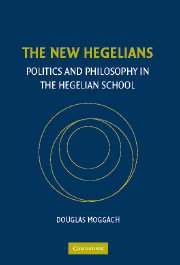Book contents
- Frontmatter
- Contents
- Acknowledgements
- Contributors
- Introduction: Hegelianism, Republicanism, and Modernity
- 1 Eduard Gans on Poverty and on the Constitutional Debate
- 2 Ludwig Feuerbach's Critique of Religion and the End of Moral Philosophy
- 3 The Symbolic Dimension and the Politics of Left Hegelianism
- 4 Exclusiveness and Political Universalism in Bruno Bauer
- 5 Republican Rigorism and Emancipation in Bruno Bauer
- 6 Edgar Bauer and the Origins of the Theory of Terrorism
- 7 Ein Menschenleben: Hegel and Stirner
- 8 ‘The State and I’: Max Stirner's Anarchism
- 9 Engels and the Invention of the Catastrophist Conception of the Industrial Revolution
- 10 The Basis of the State in the Marx of 1842
- 11 Marx and Feuerbachian Essence: Returning to the Question of ‘Human Essence’ in Historical Materialism
- 12 Freedom and the ‘Realm of Necessity’
- 13 Work, Language, and Community: A Response to Hegel's Critics
- Bibliography
- Index
Introduction: Hegelianism, Republicanism, and Modernity
Published online by Cambridge University Press: 22 August 2009
- Frontmatter
- Contents
- Acknowledgements
- Contributors
- Introduction: Hegelianism, Republicanism, and Modernity
- 1 Eduard Gans on Poverty and on the Constitutional Debate
- 2 Ludwig Feuerbach's Critique of Religion and the End of Moral Philosophy
- 3 The Symbolic Dimension and the Politics of Left Hegelianism
- 4 Exclusiveness and Political Universalism in Bruno Bauer
- 5 Republican Rigorism and Emancipation in Bruno Bauer
- 6 Edgar Bauer and the Origins of the Theory of Terrorism
- 7 Ein Menschenleben: Hegel and Stirner
- 8 ‘The State and I’: Max Stirner's Anarchism
- 9 Engels and the Invention of the Catastrophist Conception of the Industrial Revolution
- 10 The Basis of the State in the Marx of 1842
- 11 Marx and Feuerbachian Essence: Returning to the Question of ‘Human Essence’ in Historical Materialism
- 12 Freedom and the ‘Realm of Necessity’
- 13 Work, Language, and Community: A Response to Hegel's Critics
- Bibliography
- Index
Summary
We have witnessed in recent years a dramatic resurgence of interest in Hegel's philosophy. Hegel's relations to his philosophical precursors, notably Kant and the Enlightenment, have been fundamentally reconceived, and his work has received new interpretations, stressing the dynamic and open character of his reflections. Far from being of merely historical interest, these interpretations have highlighted Hegel's importance for contemporary discussions, such as republicanism or the intersubjective construction of the self and society. Hegel helps to initiate the turn away from ideas of the subject as a kind of isolated, self-referential monad that had been widely prevalent since Descartes. This epochal change was in no way undertaken only in the twentieth century, or prompted by discoveries in linguistic analysis, as some commentators claim. Describing subjectivity as formed in matrices of relationships, which are themselves fluid and evolving, Hegel contends that the social bond offers the possibility of a mutual elicitation and enhancement of freedom, not simply its restriction. He issues a profound challenge to common liberal conceptions of society as an instrumental, economic connection, and he strenuously opposes the reduction of the state's functions to the administration of the market or to the exercise of internal or external coercion. Hegel views the state as essentially the site of conscious freedom and self-determination. These views are, in principle at least, closely aligned with the republican model, which has also attracted considerable recent attention as an alternative to liberal, communitarian, and other contemporary accounts.
- Type
- Chapter
- Information
- The New HegeliansPolitics and Philosophy in the Hegelian School, pp. 1 - 23Publisher: Cambridge University PressPrint publication year: 2006



